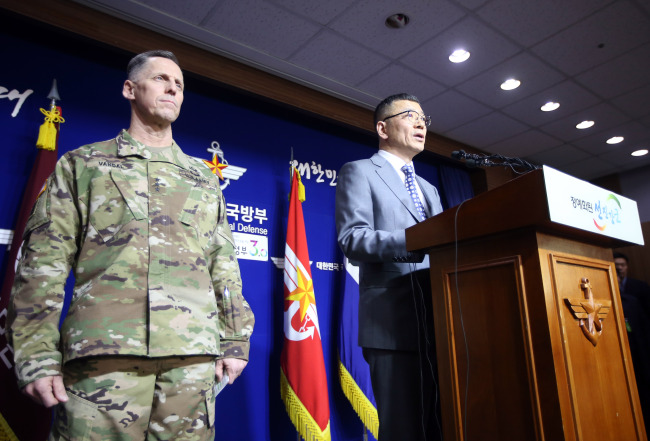The South Korean Defense Ministry said Friday that Seoul and Washington will begin discussing the deployment of Terminal High Altitude Area Defense system from next week.
“South Korea and the U.S. are in the final stage of sealing a contract to launch and operate a joint working-level team (on THAAD),” said a high-ranking defense official on customary condition of anonymity.
“The team will be able to begin discussion on issues related to the deployment of THAAD as early as next week,” the official said.
Upon North Korea’s Jan. 6 nuclear test and Feb. 7 long-range rocket launch, South Korea has decided to formally launch talks on deploying the antimissile defense system on the Korean peninsula, ending months of speculation over the deployment that is strongly contested by China, which claims it is aimed ultimately at Beijing.
On Friday, Chinese Foreign Minister Wang Yi expressed “serious concern” over the THAAD decision. The Chinese Foreign Ministry said that Wang expressed the concern to South Korean Foreign Minister Yun Byung-se during their meeting in Munich on the sidelines of international talks on Syria, and that the deployment is “not conducive to taking the proper response to the current situation and is not conducive to maintaining peace and stability in the region.”
Despite growing protest from China and Russia, South Korea and the U.S. are accelerating the preparation with the working-level team set to consult the time line of the deployment and potential sites to house the system that consists of launchers, interceptors, a radar, a fire control unit and THAAD-specific support equipment.
Safety matters and environmental costs that entail the deployment will be discussed based on both sides’ domestic laws and the Status of Forces Agreement, the official explained.
The location of the THAAD battery will be somewhere that “the military utility can be maximized with minimal safety and environmental damage to nearby residents,” the official added, referring to ongoing debate over the environmental risk the system would pose due to its strong electromagnetic waves.
The official also brushed off speculation that the location will be selected by taking China’s opposition into consideration, saying, “Considering a neighboring country’s position in choosing the location runs against the military (purpose).” Some news reports have suggested that THAAD in South Korea will be positioned further away from China, such as in the southern part of the country, rather than areas like Pyeongtaek where it directly faces China across the Yellow Sea.
 |
| South Korea’s Deputy Defense Minister Yoo Jeh-seung (right) and 8th U.S. Army commander Lt. Gen. Thomas S. Vandal announce on Feb. 7 that Seoul and Washington have formally begun talks for stationing of the Terminal High Altitude Area Defense system on the peninsula at the Defense Ministry in Yongsan-gu, central Seoul. (Yonhap) |
Based on SOFA, the official explained that the Seoul government would be providing the site and infrastructure, including electricity, water and sewage systems. The U.S. side, in turn, would bear operational costs.
One THAAD unit will be deployed at the U.S. Forces Korea base and not more, he added.
The timing will depend on the way the consultation proceeds with an aim to complete it as soon as possible, he added.

